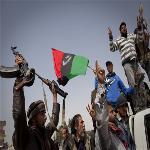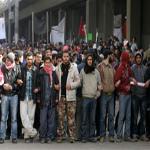March 26, 2011

Photo: AP
Rebels jubilate after taking the city of Ajdabiya, south of Benghazi, eastern Libya, March 26, 2011
Libyan rebels retook the strategic crossroads town of Ajdabiya which they lost just over a week ago, as airstrikes by coalition warplanes pound forces loyal to Libyan leader Moammar Gadhafi. Unrest also continues in Syria and Yemen, following protests Friday.
Libyan rebels chanted and fired their automatic rifles into the air after capturing the strategic town of Ajdabiya, which controls key roadways into eastern Libya. The victory marks a serious setback for pro-government forces which had taken the town from the rebels just a week ago.
Coalition warplanes earlier had bombed Gadhafi's military targets in Ajdabiya, destroying several tanks. A rebel spokesman said African mercenaries were killed in the fighting. Al-Arabiya TV showed several dozen African mercenaries, captured by the rebels.
Fighting also continued in the western Libyan town of Misrata, close to Tripoli. Witnesses inside the town told Al-Jazeera TV that pro-Gadhafi forces continued to pound the town with field artillery, while storming houses in search of rebel fighters. The TV also claimed that Mr. Gadhafi's forces were preventing aid ships from resupplying the town by sea.
A Libyan government spokesman reiterated claims that coalition warplanes were killing civilians. Rebel leaders in Benghazi said the claims were unfounded.
U.S. President Barack Obama said Saturday that Libya's air defenses had been undone and that responsibility for the Libyan operation was being transferred from the United States to its NATO allies, who are enforcing the U.N. mandated no-fly zone over Libya and the arms embargo at sea.
Jordan

AP
Jordanian protesters line up after pro-government supporters pelted them with stones, injuring six people during a protest at the camp in central Amman, March, 25, 2011Elsewhere in the Middle East, anti-government protests continued in Yemen, Syria and Jordan. Security forces intervened to disperse protesters in the Jordanian capital Amman Friday, causing a number of casualties. Jordanian Prime Minister Samir Bakhit accused Islamists in Syria and Egypt of provoking the violence. He argued that security forces had no choice but to intervene.
He says that rival protesters exchanged insults and threw rocks at each other forcing the government to deploy security forces to prevent the situation from getting out of control.
Syria
In nearby Syria, hundreds of protesters turned out in the town of Sanamein, near the southern city of Diraa, Saturday to bury six people killed in violence a day earlier. Syria's highest Muslim religious leader, Mufti Ahmed Badr el Din Hassoun complained that Islamic preachers in the region were working to create sectarian strife in Syria.
He says that [violence] in Diraa, Sanamein and Latakia Friday were provoked by outside forces as reports will soon show. The Syrian people, he insists, are smarter than these preachers of strife who are calling on them to kill each other along sectarian lines.
Yemen
Meanwhile in Yemen, Foreign Minister Abu Bakr al-Qirbi stated Saturday that embattled Yemeni President Ali Abdullah Saleh is negotiating the terms of his resignation with opposition leaders. Saudi Arabia is reported to be playing a key role in mediating. Tens of thousands of opposition protesters turned out across the country Friday to demand Mr. Saleh's resignation.